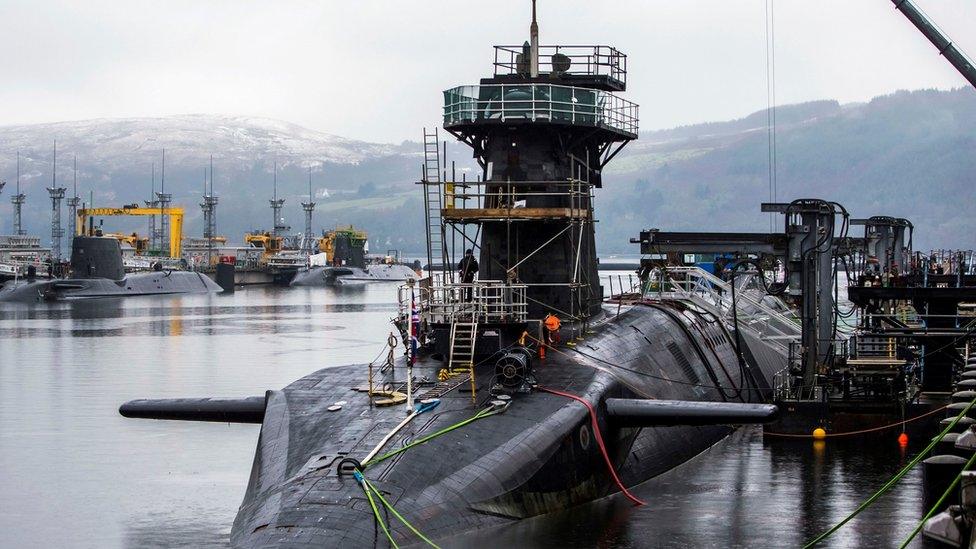Replacing Trident could take the UK-US 'special relationship' to "new heights"
- Published
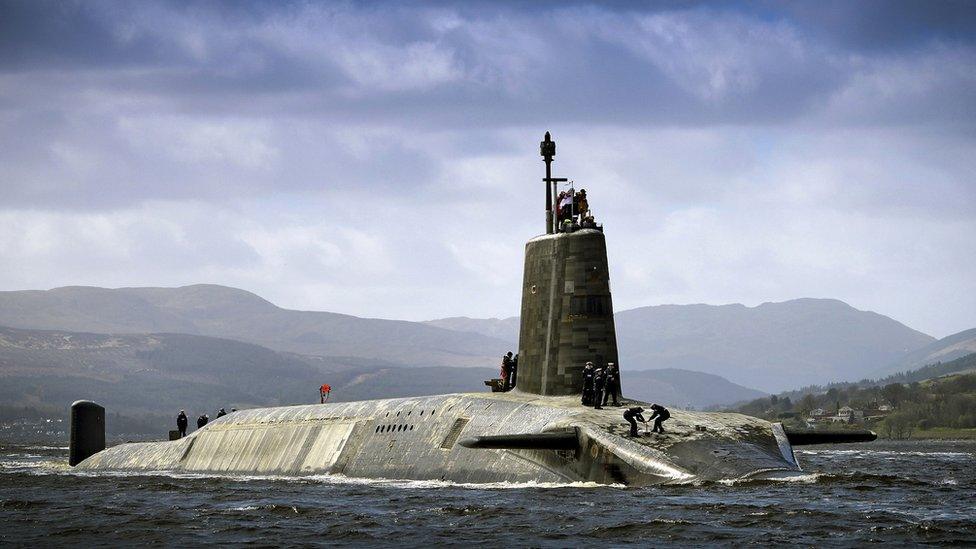
HMS Vigilant
UK cooperation with the United States on nuclear weapons has reached "new heights", with the new warhead for the Trident missile, BBC Newsnight has learned.
The cooperation extends not just to the design of the new device, but to British lobbying in Washington for funding for the new weapon, known as W93, in order to protect the project from cuts favoured by those on the left of President Joseph Biden's Democratic party.
Last year, the UK Defence Secretary Ben Wallace wrote to a key congressional committee urging it to fund the W93 warhead, arguing it was, "crucial that we demonstrate transatlantic unity and solidarity in this difficult period".
BBC Newsnight has learned that UK lobbying to keep the project funded in the face of a nuclear posture review by the new administration has continued.
"There is a question there", says Lord Darroch, British ambassador to Washington 2016-2019, "the democrats were quite critical of it, questioning the need for a re-designed warhead when they were in opposition, and they're going to look at it again now and it may be a while before we see the outcome of that".
Lisa Gordon-Hegarty, who until November ran the US nuclear weapons industry as Administrator of the National Nuclear Safety Administration (NNSA), has told BBC Newsnight, "there is no doubt in my mind that these conversations have been taking place in the national security council staff and with the secretaries of state and defence and their counterparts in the UK and perhaps with president Biden and with the prime minister. It's important, it's imperative that we continue to remain in alliance, in alignment with our UK counterparts".
The cost of modernisation
The W93 project is part of a $19bn package of projects being urged by the NNSA after many years in which the US did not invest in new atomic weapons.
The modernisation has come under fire from elements of President Biden's party who do not want to invest in such warheads at a time when the country needs to spend heavily on Covid recovery.
The UK effort in Washington has sought to convince people of the W93 project's urgency even though it is not required by the US Navy until the late 2030s.
"We are arguably a little bit ahead of need on that", Congressman Adam Smith, chair of the House Armed Service Committee, has said, "do we need the money right now? I think the UK is pushing a lot of that".
The NNSA and US Navy are managing to leverage the fact that scrapping the project would leave a key ally unable to operate its nuclear fleet. The W93 is also demonstrating that while the UK insists that it operates the Trident system independently, it cannot get out of sync with American warhead development.
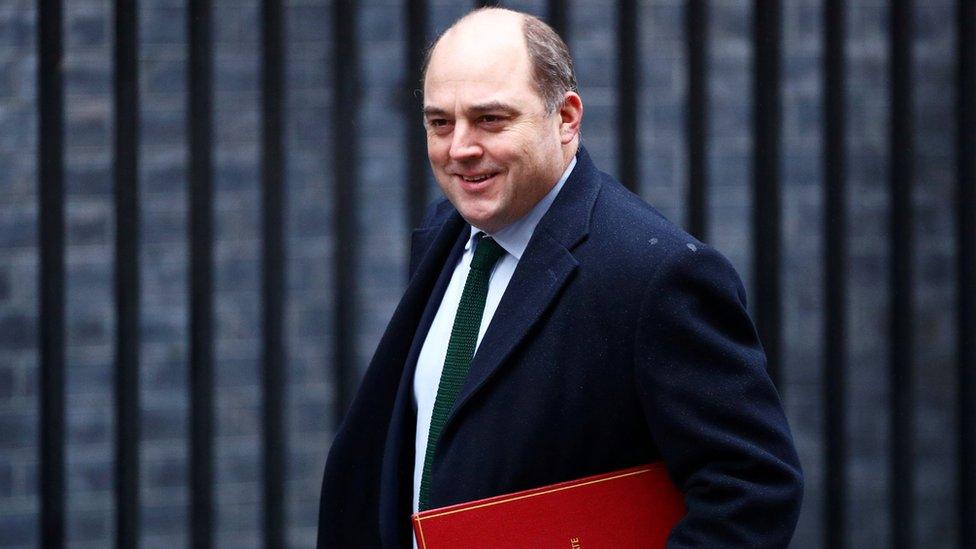
Defence Secretary Ben Wallace is calling on the US to back spending on the new W93 warhead.
Currently the UK has just under 200 warheads that were introduced in the 1990s under the codename Holbrook.
At the beginning of each commission, UK Trident submarines sail to America to pick up missiles held in a common stock. They then return to this country, where the Holbrook warheads are fitted to each missile.
US programmes to modernise the missiles and create the new W93 warhead mean the UK cannot simply keep using the Holbrook.
"Our warheads have to match theirs exactly, in terms of flight performance, in order to remain certified", one figure from this secret world says, explaining a UK decision early in 2020 to replace the Holbrook.
The W93, "is actually a joint project, in design terms", another official briefed on the project says, "it takes the nuclear special relationship to new heights". Certainly, the idea of a bi-national warhead project is quite unique in the atomic weapons world.
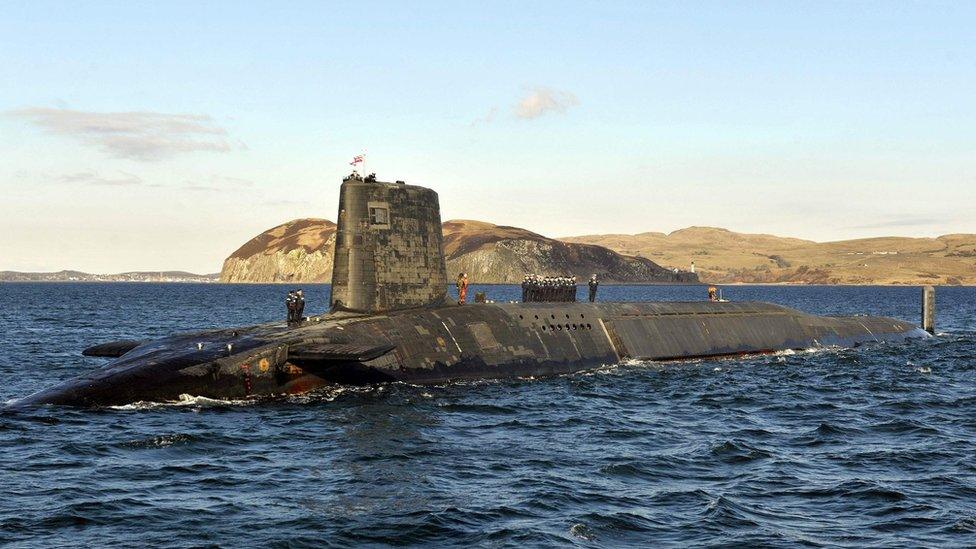
Anglo-American cooperation extends to the struggle to get the project funded.
While the chair of a key congressional committee has said the UK is pushing the timetable, works needed to prepare the Atomic Weapons Establishment at Aldermaston to make new warheads are in fact years behind schedule.
HMG's lobbying in Washington would therefore appear designed to help the programme through a potentially difficult period when nuclear projects are coming under heightened political scrutiny rather than being driven by Britain's production schedule.
The Dreadnought programme, building four new submarines to carry the updated Trident, has an estimated cost of £31bn.
The price of the new warheads is not included in that figure and BBC Newsnight has learned that, once the modernisation of facilities at Aldermaston is taken into account, it could reach £10bn over the next 15 years.
There are concerns that it could eat into the additional funding being given to the MoD.
An MOD spokesperson said: "We do not comment on other nation's nuclear programmes, but since the 1958 Mutual Defence Agreement the UK has benefited from decades of cooperation with the US on nuclear issues.
"We continue to work closely to ensure our warhead remains compatible with the US Trident Strategic Weapon System and are currently reviewing a range of options for the UK's sovereign Warhead Replacement Programme."
You can watch Newsnight on BBC Two weekdays at 22:30 or on iPlayer, subscribe to the programme on YouTube, external and follow it on Twitter, external.
Related topics
- Published26 February 2021

- Published23 May 2017
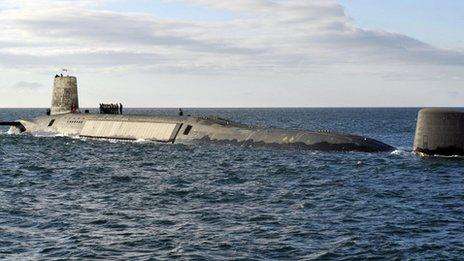
- Published10 January 2020
